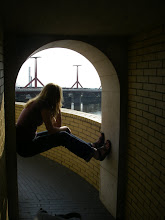I remember going to our family reunion each year and all the
elders would remark at how much my sisters and I had grown, a few inches
perhaps. Nothing relative to the
rate of a mushroom. We drove up to my porcini spot on Saturday to check on the
progress of those adorable buttons we left behind a couple of days ago. Not only had they grown into beautiful
young adults, but they had company—all their brothers, sisters, cousins, aunts,
uncles, friends, and maybe even a a few strangers. In just a couple of hours, one in the rain, which meant
hanging out under the canopy of trees longer than really necessary, we
collected 15 pounds. We also found
about a pound of oyster mushrooms, so many butter boletes and slippery jacks
that we left them behind, and a few aspen boletes. Although we didn’t collect any, the amanita muscaria were
also out in full force. They are
so gorgeous with their bright red caps and white polka dots, some still in egg
form and others proudly opening up to show off their perfectly white gills. I think we took more photos of those
beauties than all other mushrooms combined!
That evening, we hunkered down in Butter with a fancy bottle
of Wyoming wine, which was the only local wine available on our drive through
the state, to clean our bounty. Evicting the occupants and undesirables is an
important part of foraging for mushrooms, because one or two can quickly turn
into a massive party, which means rotten mushrooms. Cutting them out right away is essential.
The next morning, we woke up to the sound of off road
vehicles passing back and forth on the adjacent dirt road. Back and forth, back and forth, back
and forth. Maybe it was a sign
that we needed to get up early to start hunting. For breakfast, Andre chopped some fruit and berries, I grabbed
a handful of nuts and seeds, and topped that goodness with a sprinkle of that
dumpster oat bran we have grown to love.
Since we had just collected at my usual spots yesterday, we explored a
new part of the mountain. The
hillsides were covered in raspberries, strawberries, and whortleberries, which
we munched on while hiking. We also found a couple of red huckleberry bushes,
at least that’s what I think they were, but since they weren’t quite ripe we
left them behind. A couple of
hours later, our bags were full and the sky grew dark and heavy. Lightning had
already started, thunder was crashing, so we made a beeline for the bus. Eight more pounds of porcini, this
time, debugged in the forest.
Andre wanted to see the Moffat tunnel, so in the pouring rain
and hail we drove down the now river of a road and headed that way. The lightning was spectacular,
especially from the safety of Butter.
What should have taken maybe 5 minutes instead took more like 30 thanks
to all the Aspen trees housing those shaggy-stemmed Aspen boletes. Each time we spotted an orange cap,
easy to see from the bus, one of us would jump out with our knife, run to the
edge of the forest, and grab the goods (usually they have friends), then run
back to the car, soaked but happy.
Using this car-hunting method, we probably picked 2-3 pounds before we
decided not to look anymore. At
some point, you just have to stop… something we’re still learning.
Now, what do hunters who want to go back out again today do
with nearly 30 pounds of various mushrooms? What the restaurants don’t buy, we’ll dry… but it’s already
9:30 and those cuties are waiting.




